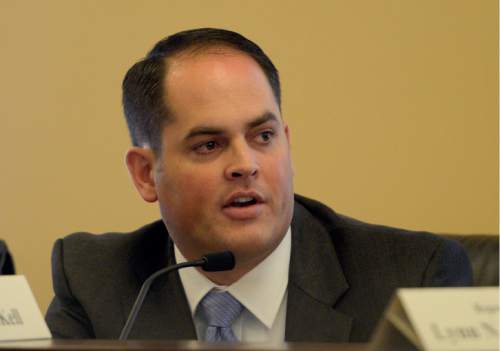This is an archived article that was published on sltrib.com in 2015, and information in the article may be outdated. It is provided only for personal research purposes and may not be reprinted.
Lawmakers didn't discuss wolves' status as a protected species during the 2015 Legislature — not until the very end.
Two hours before the final gavel dropped, Spanish Fork Republican Rep. Mike McKell rose to defend giving activists $500,000 to pressure federal officials to return wolf management to the states.
McKell's proposed line item had not been discussed publicly during the normal state budgeting process, even though it has been the source of past controversy.
"This is a big deal, a big deal for ranchers. It's a big deal for wildlife in this state," McKell proclaimed on the House floor after another lawmaker suggested spending the money on air quality research instead.
"I'm not ashamed of this," he added. "I don't want the wolf in Utah. We can't afford to have the wolf in Utah."
McKell believes wolf packs are wiping out elk in Idaho's Panhandle. The same can't happen in Utah, he says.
The U.S. Fish and Wildlife Service first proposed delisting the gray wolf nationwide from the Endangered Species Act in 2013. Removing the wolf from the protected list would pass management of the predators on to the states, neatly aligning with Utah leaders' policy goals.
But federal wildlife managers now are rethinking the wisdom of stripping protections from an apex predator that was once hunted, trapped and poisoned to the brink of extinction. The wolf has yet to recover on "a significant portion of its range," as required under the law to warrant a delisting.
No packs have been established in Utah and McKell, the House chairman of the Natural Resources Appropriations Subcommittee, wants to keep it that way by lobbying for congressional intervention.
His last-minute appropriation will renew a contract with Ryan Benson, a lawyer affiliated with Sportsmen for Fish and Wildlife and its politically connected founder, Don Peay.
Since 2010, Utah has directed $800,000 to Big Game Forever, an anti-predator advocacy outfit founded by Benson and Peay, even though the group has never explained how it has spent the money.
The group's opaque accounting drew a rebuke from the legislative auditor in October of 2013, who was frustrated there was no way to determine if the money was being put to its designated purpose.
A year later, the Utah Department of Natural Resources awarded Benson a $2 million contract to thwart an endangered species listing for greater sage grouse. A former patent lawyer and an avid big game hunter, Benson had minimal prior experience with the bird species.
McKell said his goal with the wolf appropriation is to get Utah covered in proposed federal legislation ordering the secretary of the Interior to delist wolves in Wyoming and the Western Great Lakes region.
"It's imperative to ensure that the state of Utah is in this fight," McKell said. "This funding is incredibly important."
Wildlife conservation groups describe Utah's effort as incredibly wasteful, and mired in "residual hatred of predators" that excludes any appreciation of the ecological benefits they provide as a keystone species.
"Congress is the least appropriate organization to get involved with these biological decisions. Where is their expertise?" said Don Barry, executive vice president of Defenders of Wildlife. "Whether a species is heading toward extinction is a scientific calculation. It is not a political one."
The wildlife service already has delisted wolves for the Great Lakes and Wyoming, but federal judges have ruled these changes are premature under suits filed by Defenders and other groups. Those rulings prompted Wisconsin Congressman Reid Ribble, a Republican, to introduce HR884, directing the Interior to finalize the delisting rules.
But Barry noted Fish and Wildlife has made no final determination whether to delist wolves nationally, so the logic supporting HR884 cannot be applied to Utah, which has documented only itinerant wolves.
A far-roaming female from Wyoming was killed Dec. 28 after a bounty hunter mistook her for a coyote.
And last fall, photos confirmed the presence of a male wolf on the south slope of the Uinta Mountains.
Benson has made a good living promoting a "Big Bad Wolf" narrative.
Big Game Forever paid Benson $190,000 and Peay $90,000 in 2012, according to financial disclosures filed with the IRS.
Whatever its funding from Utah's Legislature, the group's claims that wolves are running amok in Idaho, eradicating big game, have little basis in science, critics say.
Since 2009, wolf numbers have plateaued in the Northern Rockies to about 1,700 animals in 320 packs, according to Fish and Wildlife.
And the National Park Service says Yellowstone wolf numbers peaked in 2003 at 175 and have since slipped to half that many.
Those numbers still far exceed federal recovery goals, but they are nowhere near the 4,000 wolves that Big Game Forever says stalk the region.
Idaho's elk declines, particularly in the Lolo region in the state's Panhandle, are largely due to habitat changes, according to Dan MacNulty, a Utah State University wildlife biologist who studies wolves.
The Big Burn wildfire of 1910 not only gave rise to a fledgling U.S. Forest Service and its fire-fighting mission, but also transformed parts of the Northern Rockies into great habitat for elk, whose numbers soared during the very decades hunters rid the landscape of big predators.
A policy of fire suppression also changed the forests in ways that don't favor elk, allowing conifers to encroach into open meadows, MacNulty said. And spring green-ups occur more quickly now, leaving elk cows insufficient time to bulk up on nutritious grasses.
"Wolves kill elk calves," MacNulty said. "They will have an effect, but is secondary to these bottom-up effects."
Salt Lake City Democratic Rep. Joel Briscoe and other House Democrats were incensed that the wolf appropriation, which the Division of Wildlife Resources did not seek, advanced without a hearing.
"If it's that needed, why not do it in public like everyone else?" Briscoe asked. "This is why you have a bicameral legislature, so there is more than one chance to look at a bill."
In the final hours of the 2015 session, lawmakers discovered a few million dollars available and House budget managers agreed wolf delisting was worthy of support, according to McKell.
Idaho has allocated $400,000 to kill wolves, which are inflicting $30 million in economic impacts, McKell said. Idaho's "state plan is clearly failing. They are not taking out enough wolves," he argued. "I have seen the devastating impacts of wolves. That's something we never want to see in Utah."
McKell claims hunting generates $2.3 billion in revenue for the state of Utah.
Briscoe argues those who want to keep wolves out are more interested in preserving unnaturally large big game herds than in doing what's right for the landscape.
"It seems to me they are trying to manage for hunters, a limited segment of the population," Briscoe said. "They love it when there are lots of elk. You don't have to work very hard to find them."





